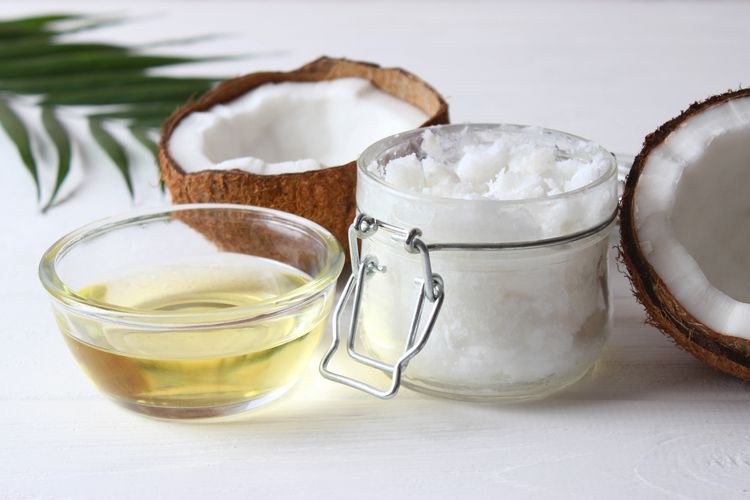Is Coconut Oil Safe for Dogs?

Coconut oil is a food ingredient that has grown in popularity as a kind of natural remedy and dietary supplement. People have claimed to experience a variety of health benefits when consuming coconut oil or applying it topically. It's not surprising that some dog owners have considered using coconut oil on their dogs for the health benefits it may provide.
Before embracing this dietary fad and using coconut oil on your dog, find out how safe it actually is and whether or not you can expect positive results.
What Is Coconut Oil?
Coconut oil is made by extracting the oils from coconuts. It can be used to prepare foods but can also be used as a dietary supplement. Coconut oil contains saturated fatty acids called medium-chain triglycerides. MCTs, like palm kernel oil and coconut oil, have different properties from long-chain triglycerides like olive oil, soybean oil, avocado oil, and fish oil. In theory, MCTs may be more easily digestible and a better source for quick energy than LCTs. MCTs may contain caprylic acid and capric acid, both of which have anti-fungal properties. They may also contain lauric acid, which has antibacterial, antiviral, and antifungal properties.
Is Coconut Oil Beneficial to Dogs?
Any natural substance with supposed antibacterial, antifungal, and antiviral properties is likely to become popular with people looking for natural remedies. All of the hype makes coconut oil sound like a miracle food. However, it's essential for dog owners to understand that none of these claims are backed up by science. In truth, studies have been largely inconclusive regarding the purported benefits of coconut oil. Additionally, these studies have mainly been done on humans and not animals.
Some people believe that the MCTs found in coconut oil may aid in digestion, heal digestive disorders, and reduce inflammation. It is also possible that MCTs can help with brain energy and cognition in older dogs.
Some owners report that the topical use of coconut oil has improved skin conditions such as hot spots or itchy, dry skin. These owners used over-the-counter shampoos made with organic coconut oil and recipes for DIY paw balm to not only achieve these results, but to also help give their dog a shiny, glossy coat.
Other anecdotal evidence suggests that coconut oil may help with metabolic functions, aid in weight loss, and alleviate pain from arthritis as well as improving bone health.
Remember that anecdotes are not scientifically sound. Before you decide to add coconut oil to your dog's diet or apply it to the skin, be sure to consider potential risks as well. As always, your veterinarian is the best source of information regarding your dog's health. Do not begin using coconut oil on your dog before you consult your vet.
Is Coconut Oil Safe for Dogs?
Despite the possible health benefits, coconut oil might not be healthy for your dog. Though not poisonous, it is a high-fat food that can cause complications in dogs with certain health conditions. In addition, dogs may gain weight on this fatty food, risking obesity and all the health issues that come along with it.
Before you follow advice from friends and random people who rave about the benefits of coconut oil, remember that their stories are not a substitute for scientific research that takes place in a controlled environment, among a large group of dogs, and is both repeatable and peer-reviewed.
Can I Use Coconut Oil on My Dog?
As mentioned previously, consult your veterinarian before using coconut oil. Your vet knows your dog's medical history and physical condition, and can offer specific instructions and advice about how, if the vet deems it safe, to incorporate it into your dog's routine.
Topical use may be easily administered, but remember that your dog may lick it off the skin and ingest it anyway. Oral use should be done carefully, only giving your dog the amount recommended by your vet. Too much coconut oil can lead to vomiting, greasy diarrhea, weight gain, and other illnesses. In general, vets caution against increased fat in the diet for dogs with histories of pancreatitis and those prone to gaining weight. Other diseases and metabolic conditions can be exacerbated when using coconut oil.
If your vet gives you the go-ahead to use coconut oil topically or orally in your dog, be sure to get unrefined (also called "virgin") oil. Cold-pressed coconut oil is considered ideal.
Not all coconut oils taste the same. Some may have a stronger coconut flavor than others, so you may need to experiment with your dog to see what kind is preferred.